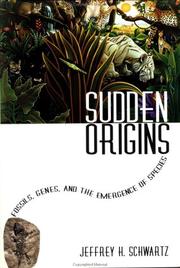Check nearby libraries
Buy this book

The greatest riddle of evolution has been the following puzzle: while Darwin argued that new species emerge through a slow, gradual accumulation of tiny mutations, the fossil record reveals a very different scenario - the sudden emergence of whole new species, with no apparent immediate ancestors. This discrepancy has fueled heated debate among evolutionary theorists and has provided unfortunate fodder to creationists, who see it as proof that evolution doesn't happen at all.
Now, in this book, paleoanthropologist Jeffrey Schwartz presents a radical new theory of evolution, which brings together evidence from genetics, paleontology, embryology, and anatomy to solve this great outstanding riddle. Central to the new theory is the recent discovery of a special kind of gene, known as homeobox genes, which can cause dramatic mutations that express themselves suddenly in the form of a new species.
Such a new species will appear to have arisen out of thin air, with no lineage of ancestors. The new theory preserves natural selection, but shows that it is not the primary engine driving evolution, after all. Sudden Origins is a provocative and important book that will change the debate about evolution and challenge a number of popular ideas premised on the foundation of Darwinism. This book is crucial reading for anyone who has ever pondered the mysteries of our evolutionary heritage.
Check nearby libraries
Buy this book

Previews available in: English
| Edition | Availability |
|---|---|
|
1
Sudden Origins: Fossils, Genes, and the Emergence of Species
March 10, 2000, Wiley
in English
0471379123 9780471379126
|
zzzz
|
|
2
Sudden origins: fossils, genes, and the emergence of species
1999, Wiley
in English
0471329851 9780471329855
|
aaaa
|
Book Details
Edition Notes
Includes bibliographical references (p. 380-404) and index.
Classifications
The Physical Object
ID Numbers
Source records
Internet Archive item recordLibrary of Congress MARC record
Internet Archive item record
Better World Books record
Promise Item
marc_nuls MARC record
marc_columbia MARC record
First Sentence
"In late 1993, a team of paleoanthropologists, whose members came from Japan, Ethiopia, and the United States, discovered the oldest fossil remains of a potential human ancestor-almost 41/2 million years old."
Community Reviews (0)
Feedback?| July 15, 2024 | Edited by MARC Bot | import existing book |
| October 17, 2022 | Edited by ImportBot | import existing book |
| October 17, 2022 | Edited by ImportBot | import existing book |
| August 20, 2021 | Edited by MARC Bot | import existing book |
| December 9, 2009 | Created by WorkBot | add works page |











